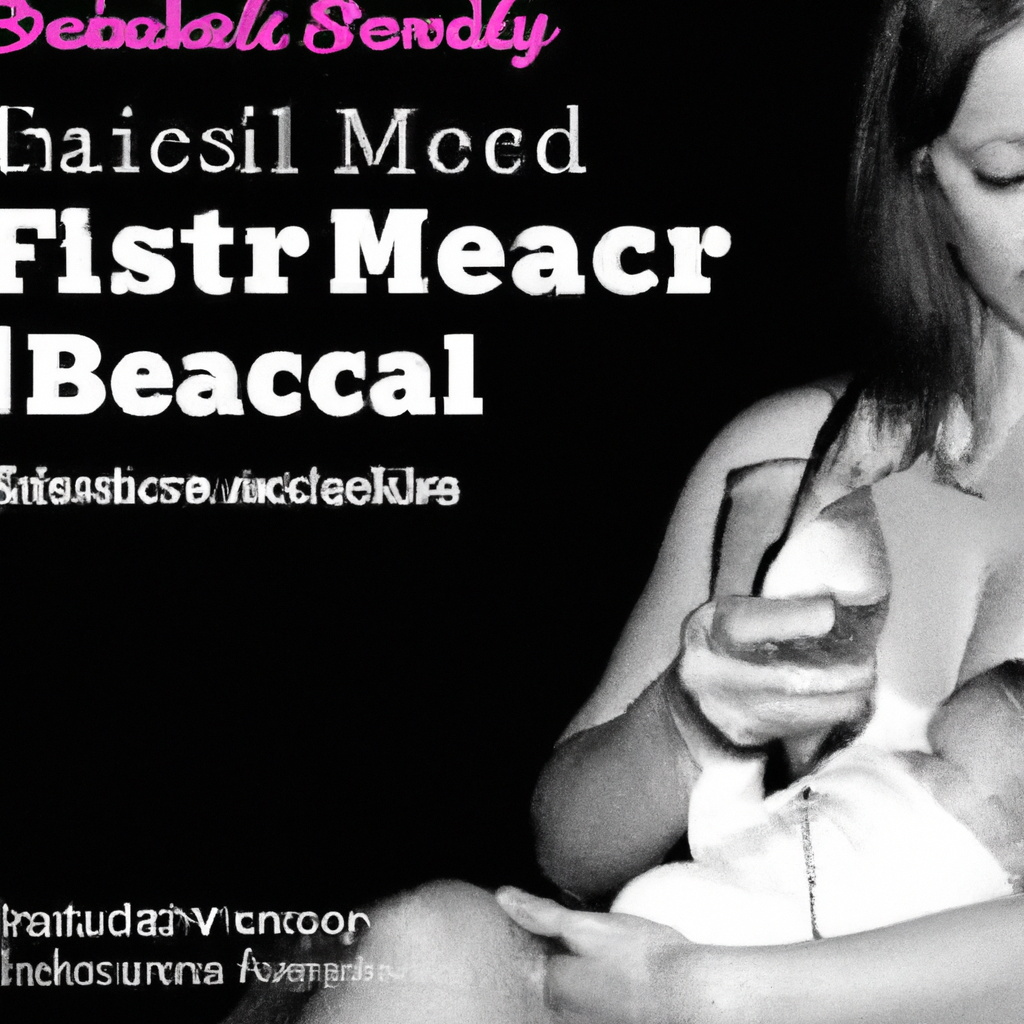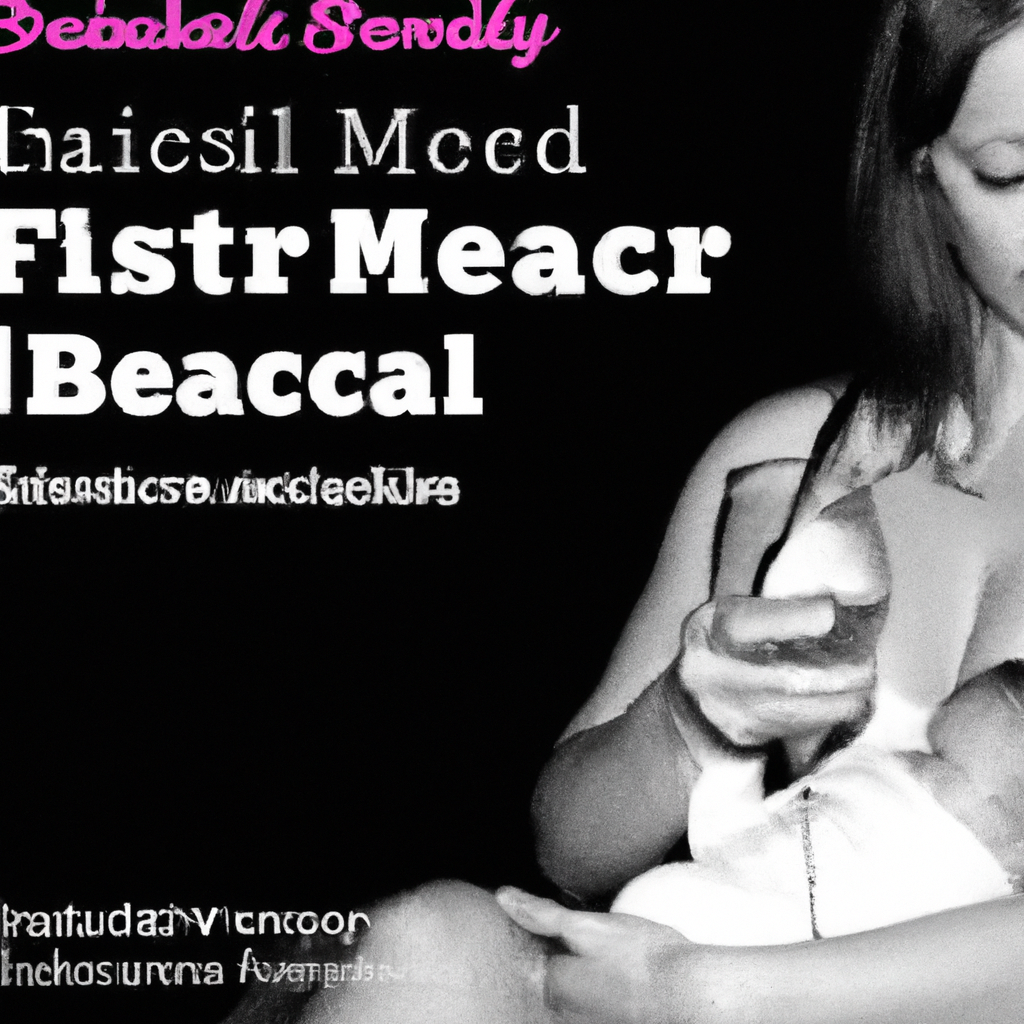You’re a new parent, navigating the joys and challenges of breastfeeding. As you settle into this beautiful bonding experience, the question of whether alcohol consumption is compatible with breastfeeding has likely crossed your mind. In this article, we will explore the important considerations and guidelines surrounding breastfeeding and alcohol consumption, ensuring that you are equipped with the knowledge to make informed decisions for yourself and your baby.
Is it safe to drink alcohol while breastfeeding?
Breastfeeding mothers often have questions about whether it is safe to consume alcohol while nursing their baby. The well-being of both the mother and the baby is of utmost importance, and it is crucial to understand how alcohol can affect breast milk and the potential risks involved.
How does alcohol affect breast milk?
When a breastfeeding mother consumes alcohol, it enters her bloodstream and can be transferred to her breast milk. The alcohol concentration in breast milk is similar to the concentration in the mother’s blood. However, breast milk does not trap alcohol; instead, it can leave the milk as time passes. This means that alcohol levels in breast milk can vary depending on the mother’s alcohol metabolism rate.
What happens if a breastfeeding mother drinks alcohol?
If a nursing mother consumes alcohol, it can affect both her and her baby. Alcohol can impede the let-down reflex, which is essential for milk production and flow. It may also disrupt the baby’s sleep patterns and cause irritability. Furthermore, alcohol consumption can impair the mother’s judgment and coordination, making it unsafe to handle the baby.
Is there a safe amount of alcohol while breastfeeding?
While there is no precise safe level of alcohol consumption during breastfeeding, experts recommend being cautious and minimizing alcohol intake. The American Academy of Pediatrics (AAP) suggests waiting at least 2 hours before nursing if a mother consumes a moderate amount of alcohol. However, it is worth noting that individual metabolisms vary, and alcohol may affect each person differently.
Can alcohol affect the baby through breast milk?
Yes, alcohol can affect the baby through breast milk. When a breastfeeding mother drinks alcohol, the baby ingests it through nursing. Alcohol can alter the taste and odor of breast milk, potentially leading to the baby’s refusal to feed. Additionally, alcohol can impair the baby’s motor skills and cognitive development, so it is important to consider the potential risks.
How long does alcohol stay in breast milk?
The time it takes for alcohol to leave breast milk depends on various factors, including the mother’s weight, alcohol metabolism, and how much she consumed. On average, it takes about 2-3 hours for the body to metabolize a standard alcoholic drink. However, it is essential to keep in mind that even after alcohol has cleared from the bloodstream, traces may still be present in breast milk.
Does pumping and dumping milk help remove alcohol?
Contrary to popular belief, pumping and dumping breast milk does not accelerate the removal of alcohol from the body. Since breast milk and alcohol metabolize at a similar rate, pumping and discarding milk can only help if the mother needs to relieve engorgement or maintain her milk supply.
Can alcohol consumption affect milk production?
Alcohol consumption can potentially decrease milk production, as it affects the let-down reflex and disrupts hormonal balance. It is important for breastfeeding mothers to maintain a healthy milk supply, so moderation and caution are advised when it comes to alcohol intake. Staying well-hydrated, eating a balanced diet, and nursing frequently can help support milk production.
What are the risks of drinking alcohol while breastfeeding?
Drinking alcohol while breastfeeding can have several risks. In addition to the potential harm to the baby’s development and sleep patterns, it can also impair the mother’s ability to care for her child safely. Excessive alcohol consumption can lead to drowsiness, impaired judgment, and delayed reflexes. It is crucial to prioritize the well-being of both the mother and the baby and make informed choices regarding alcohol consumption.
How does alcohol affect the baby’s sleep?
Alcohol can disrupt the baby’s sleep patterns and cause restless sleep. It can affect the baby’s ability to fall asleep and stay asleep, leading to frequent waking during the night. This can be distressing for both the baby and the mother, as they may struggle to get enough quality sleep. Considering the impact on the baby’s sleep, breastfeeding mothers should be mindful of their alcohol consumption and its potential effects.
Can alcohol affect the baby’s development?
Yes, alcohol consumption while breastfeeding can potentially impact the baby’s development. Alcohol is a known teratogen, meaning it can cause harm to a developing fetus or infant. It can affect the baby’s brain development, motor skills, and cognitive function. To ensure the best possible outcomes for the baby, it is advisable for breastfeeding mothers to avoid excessive alcohol consumption.
How to handle alcohol consumption while breastfeeding
Breastfeeding mothers who choose to consume alcohol can take certain precautions to minimize the potential risks to both themselves and their baby. By following some guidelines, nursing mothers can make informed decisions and manage alcohol consumption responsibly.
What are the recommendations for breastfeeding mothers and alcohol?
Health organizations, such as the American Academy of Pediatrics (AAP) and the Centers for Disease Control and Prevention (CDC), provide recommendations for breastfeeding mothers regarding alcohol consumption. It is generally advised to wait at least 2-3 hours per drink before breastfeeding to allow alcohol to clear from the body. This can help minimize the amount of alcohol ingested by the baby.
How to calculate the alcohol metabolization time?
To estimate the time required for alcohol to be eliminated from the body, it is helpful to understand the average alcohol metabolization rate. On average, it takes about one hour for the body to metabolize one standard alcoholic drink. However, individual factors such as weight, metabolism, and tolerance can influence the rate at which alcohol is processed.
Is it better to plan breastfeeding sessions around alcohol consumption?
Planning breastfeeding sessions around alcohol consumption can be a helpful approach. By timing nursing sessions and alcohol consumption strategically, mothers can ensure that there is an adequate time gap to allow alcohol to clear from their system before breastfeeding. This can help reduce the amount of alcohol present in breast milk.
What are alternative options to alcohol while breastfeeding?
Breastfeeding mothers who want to enjoy a drink without consuming alcohol can opt for alcohol-free alternatives. These can include mocktails, non-alcoholic beers, and other beverages designed to resemble alcoholic drinks but without the alcohol content. This allows mothers to enjoy the experience of a drink without the potential risks associated with alcohol.
Can breastfeeding mothers still enjoy occasional drinks?
Breastfeeding mothers can still enjoy occasional alcoholic drinks, but it is important to exercise caution and moderation. By following the recommended guidelines and allowing sufficient time for alcohol to clear from the body, mothers can make choices that prioritize the well-being of their baby while still enjoying social occasions.
Should breastfeeding mothers avoid drinking completely?
It is not necessary for breastfeeding mothers to avoid drinking alcohol entirely. However, it is crucial to understand the potential risks and make informed decisions about alcohol consumption. By exercising moderation, planning ahead, and considering alternative drink options, breastfeeding mothers can enjoy the occasional drink while minimizing the potential impact on their baby.


Tips for breastfeeding mothers who choose to drink alcohol
Breastfeeding mothers who choose to drink alcohol can follow certain strategies to minimize the impact on their breast milk and their baby’s well-being. These tips can help breastfeeding mothers safely navigate alcohol consumption while nursing their little ones.
How to minimize alcohol’s impact on breast milk?
To minimize the impact of alcohol on breast milk, it is important to follow several key practices. Ensure that breastfeeding sessions are strategically planned around alcohol consumption, allowing sufficient time for alcohol to clear from the body. Drinking plenty of water and staying hydrated can also help dilute alcohol in breast milk. Lastly, maintaining a healthy diet and regular nursing routine can support overall milk production and quality.
What are recommended alcohol-free alternatives?
Breastfeeding mothers can enjoy a wide range of alcohol-free beverages as alternatives to alcoholic drinks. Mocktails made with fruit juices, sparkling water, or herbal iced teas can provide a refreshing and satisfying experience without the alcohol content. Non-alcoholic beers and wines are also available, allowing mothers to enjoy the flavors without the potential risks associated with alcohol.
Can pumping before drinking help?
Pumping breast milk before drinking alcohol can help alleviate engorgement and maintain milk supply, but it does not remove alcohol from the body any faster. If a mother plans to consume alcohol, she can pump and store breast milk beforehand to have it available for feeding the baby during the time when alcohol is present in her system.
How to determine if breast milk contains alcohol?
Breast milk that contains alcohol can have a distinct smell and taste. However, it is important to note that babies’ preferences can vary, and some may not be able to detect the alcohol flavor. If a breastfeeding mother is concerned about the presence of alcohol in her breast milk, she can consult a healthcare provider or consider using alcohol test strips specifically designed for breast milk.
Should breastfeeding mothers use alcohol test strips?
The use of alcohol test strips for breast milk can offer some reassurance to breastfeeding mothers. These test strips are designed to detect the presence of alcohol in breast milk and can provide a general indication of its concentration. However, it is important to remember that these test strips do not replace professional advice. Consulting a healthcare provider is advisable for accurate assessment and guidance.
What other factors should be considered when drinking alcohol while breastfeeding?
Breastfeeding mothers should consider various factors when drinking alcohol. These include the timing of breastfeeding sessions, the amount and strength of the alcoholic beverage consumed, the metabolism rate, and personal tolerance. Each person’s circumstances are unique, and it is crucial to make informed decisions based on individual factors and expert recommendations.
When is it safe to breastfeed after consuming alcohol?
The time to wait before breastfeeding after consuming alcohol can vary depending on the amount consumed, the mother’s metabolism, and the baby’s age. As a general guideline, waiting at least 2-3 hours per drink before breastfeeding is advisable. This allows adequate time for the body to metabolize the alcohol and minimize its presence in breast milk.
How to manage alcohol intake during special occasions or events?
Special occasions or events may involve alcohol, and breastfeeding mothers can still participate while ensuring the well-being of their baby. Planning ahead by pumping and storing breast milk, timing alcohol consumption with breastfeeding sessions, and monitoring alcohol intake can help manage alcohol consumption responsibly. Having a support system in place, such as a partner, family member, or trusted caregiver, can also provide assistance and peace of mind.
Myths and misconceptions about alcohol and breastfeeding
There are several myths and misconceptions surrounding alcohol consumption while breastfeeding. It is essential to separate fact from fiction to make informed decisions and ensure the health and safety of both the mother and the baby.
Does beer or certain alcoholic beverages increase milk supply?
The belief that beer or certain alcoholic beverages increase milk supply is a common misconception. While some people associate beer with improving milk production, there is no scientific evidence to support this claim. The alcohol in beer can actually have a negative impact on lactation, hindering the let-down reflex and potentially reducing milk supply.
Do alcohol-free beers or mocktails affect breast milk?
Alcohol-free beers or mocktails do not have the same impact on breast milk as alcoholic beverages. These non-alcoholic alternatives contain minimal to no alcohol content, making them safe for consumption while breastfeeding. They can provide an enjoyable and satisfying experience without any adverse effects on breast milk quality or the baby’s well-being.
Does the ‘pump and dump’ method eliminate all alcohol from breast milk?
The ‘pump and dump’ method, where a mother pumps breast milk and discards it, does not eliminate all alcohol from breast milk. Alcohol is not trapped in breast milk but rather metabolized by the body over time. Therefore, pumping and discarding milk only serves to maintain milk supply and relieve engorgement, rather than remove alcohol from the body.
Can alcohol be used as a galactagogue?
Alcohol should not be used as a galactagogue, a substance that increases milk supply. Alcohol has the opposite effect, potentially reducing milk production and hindering the let-down reflex. It is important for breastfeeding mothers to focus on maintaining a healthy lifestyle, staying hydrated, and nursing frequently to support milk production.
Can alcohol consumption enhance the breast milk’s flavor?
Alcohol consumption can alter the taste and odor of breast milk, but it does not necessarily enhance or improve its flavor. Each baby’s preferences may differ, and while some may show a preference for breast milk with a small amount of alcohol, it is generally advisable to avoid exposing babies to alcohol through breast milk.
Can alcohol increase the risk of sudden infant death syndrome (SIDS)?
Alcohol consumption by the mother can potentially increase the risk of sudden infant death syndrome (SIDS). Studies have shown a correlation between maternal alcohol consumption and an increased risk of SIDS. To minimize the risk, it is important for breastfeeding mothers to be cautious and moderate in their alcohol consumption.
Does a higher alcohol percentage in a drink affect breast milk more?
The alcohol percentage in a drink does not directly correlate to its impact on breast milk. The rate at which alcohol is metabolized and cleared from the body depends on various factors, including the mother’s metabolism and individual tolerance. Therefore, moderation and caution should be exercised regardless of the alcohol percentage in a beverage.
Is it safe to breastfeed after drinking a glass of champagne?
The safety of breastfeeding after drinking a glass of champagne, or any alcoholic beverage, depends on several factors. It is generally advisable to wait at least 2-3 hours per drink before breastfeeding, allowing sufficient time for alcohol to clear from the body. Breastfeeding mothers should make informed decisions while considering their individual circumstances and consulting healthcare professionals when in doubt.


Seeking professional advice and guidance
Breastfeeding mothers who have questions or concerns about alcohol consumption while nursing should seek professional advice and guidance. Healthcare providers, lactation consultants, and breastfeeding support groups can offer valuable information, reassurance, and personalized recommendations to help mothers make informed decisions regarding alcohol and breastfeeding.
Who should breastfeeding mothers consult about alcohol and breastfeeding?
Breastfeeding mothers can consult various professionals for guidance regarding alcohol and breastfeeding. Healthcare providers such as doctors, nurse practitioners, or midwives can provide expert advice and address specific concerns. Lactation consultants, specifically trained in breastfeeding support, can offer specialized knowledge and assistance. Additionally, joining breastfeeding support groups or forums can provide access to a supportive community and shared experiences.
Can healthcare providers offer specific alcohol guidelines for breastfeeding?
Healthcare providers, particularly those experienced in lactation and maternal health, can provide specific guidelines and recommendations regarding alcohol consumption while breastfeeding. They can consider the mother’s individual circumstances, address any potential concerns, and offer personalized advice to help mothers make informed decisions.
Are there online resources available for information and support?
Numerous online resources are available to provide information and support for breastfeeding mothers. Websites of reputable organizations such as the American Academy of Pediatrics (AAP), the Centers for Disease Control and Prevention (CDC), and La Leche League International offer evidence-based information and guidelines on breastfeeding and alcohol. It is important to refer to trusted sources for accurate and reliable information.
What organizations provide reliable information about alcohol and breastfeeding?
Several organizations provide reliable information about alcohol and breastfeeding. The American Academy of Pediatrics (AAP), the Centers for Disease Control and Prevention (CDC), La Leche League International, and the World Health Organization (WHO) are reputable sources that offer evidence-based guidelines and resources for breastfeeding mothers. These organizations prioritize the health and well-being of both the mother and the baby.
Can lactation consultants provide assistance in this matter?
Lactation consultants, who specialize in providing support and guidance to breastfeeding mothers, can offer valuable assistance regarding alcohol consumption while nursing. They possess extensive knowledge of breastfeeding and can address specific concerns and questions related to alcohol and its impact on breast milk. Consulting with a certified lactation consultant can provide reassurance and expert advice tailored to individual needs.
Is it helpful to join breastfeeding support groups?
Joining breastfeeding support groups can be immensely helpful for breastfeeding mothers, including those who have questions or concerns about alcohol consumption. These groups, whether local or online, offer a community of like-minded individuals who can provide support, share experiences, and offer practical advice. Breastfeeding support groups often have experienced members who can provide insights on balancing alcohol consumption and nursing.
Conclusion
Breastfeeding mothers who choose to consume alcohol must navigate the potential risks and make informed decisions to prioritize the health and well-being of their baby. Understanding how alcohol can affect breast milk, the potential impact on the baby, and following recommended guidelines can help mothers consume alcohol responsibly while breastfeeding. Seeking professional advice, utilizing supportive resources, and maintaining a healthy lifestyle can ensure a positive breastfeeding experience for both the mother and the baby.
